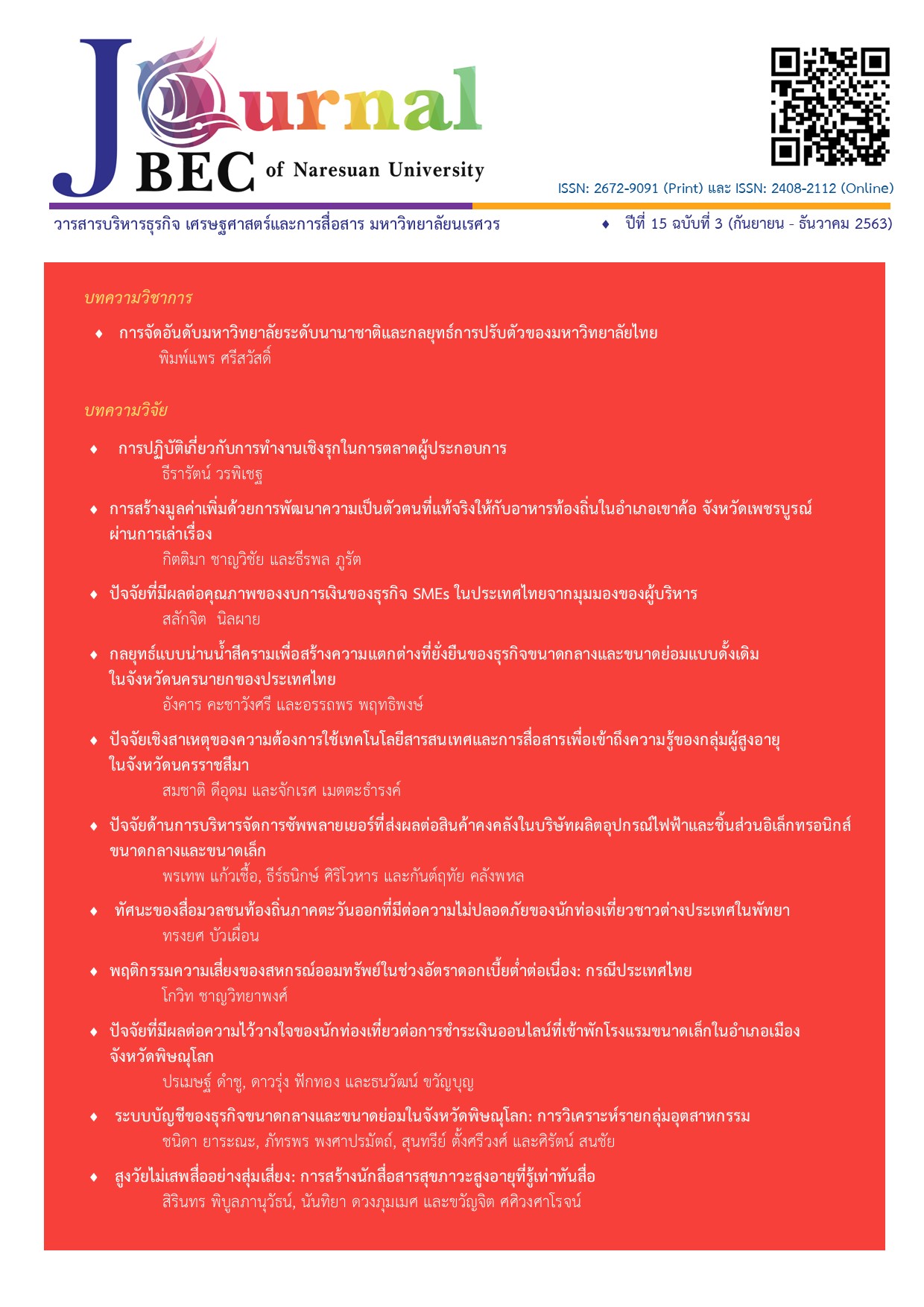ปัจจัยที่มีผลต่อความไว้วางใจของนักท่องเที่ยวต่อการชำระเงินออนไลน์ ที่เข้าพักโรงแรมขนาดเล็กในอำเภอเมือง จังหวัดพิษณุโลก
Main Article Content
บทคัดย่อ
การวิจัยครั้งนี้มีวัตถุประสงค์ เพื่อศึกษาพฤติกรรมการชำระเงินออนไลน์ของนักท่องเที่ยวที่เข้าพักโรงแรมขนาดเล็กในจังหวัดพิษณุโลก เพื่อศึกษาระดับความไว้วางใจในการชำระเงินออนไลน์ของนักท่องเที่ยวที่เข้าพักโรงแรมขนาดเล็กในจังหวัดพิษณุโลก และเพื่อศึกษาปัจจัยที่มีผลต่อความไว้วางใจของนักท่องเที่ยวต่อระบบการชำระเงินที่เข้าพักโรงแรมขนาดเล็กในอำเภอเมือง จังหวัดพิษณุโลก การวิจัยนี้เป็นการวิจัยเชิงปริมาณ โดยสอบถามจากนักท่องเที่ยวที่เข้าพักโรงแรมขนาดเล็กและใช้บริการการชำระเงินออนไลน์ใน อำเภอเมือง จังหวัดพิษณุโลก ขนาดกลุ่มตัวอย่าง 400 ตัวอย่าง และใช้การวิเคาะห์สถิติเชิงพรรณนา ประกอบด้วย ค่าเฉลี่ย ส่วนเบี่ยงเบนมาตรฐาน และสถิติเชิงอนุมาน ประกอบด้วย One sample t-test ANOVA พบว่า การชำระเงินออนไลน์ใช้สมาร์ทโฟนเป็นอุปกรณ์ในการชำระเงินออนไลน์ โดยจองผ่านโรงแรมขนาดเล็กโดยตรง ใช้บัตรเครดิตในการชำระเงิน การใช้บริการเฉลี่ย 1-2 ครั้งต่อเดือน ปัจจัยที่มีด้านความไว้วางใจในการชำระเงินออนไลน์ที่ให้ความสำคัญมากที่สุดคือ ชื่อเสียงของโรงแรมเป็นที่รู้จักในออนไลน์และออฟไลน์ ผลการทดสอบสมมุติฐาน พบว่า ปัจจัยส่วนบุคคลแตกต่างกัน ปัจจัยส่วนบุคคลด้านเพศ อายุ ระดับการศึกษา รายได้ แตกต่างกัน ความไว้วางใจการชำระเงินออนไลน์ไม่แตกต่างกัน ประกอบด้วย ปัจจัยก่อนใช้งาน ปัจจัยด้านคุณสมบัติทางอินเทอร์เฟส ปัจจัยด้านข้อมูลบนเว็บไซต์ การจัดการความสัมพันธ์ โดยกำหนดระดับนัยสำคัญทางสถิติที่ระดับ 0.05
Article Details
เอกสารอ้างอิง
Akakun,T. (2000). Action research. Ubon ratchathani: Yongsawat
Association of Thai Tourism Marketing. (2012). Tourism situation and trends National Tourism Development Plan 2012-2016. Retrived February, 2 2019. From http://www.attm.biz/news/326755/www.mots.go.th Atkinson, S., & Butcher, D. (2003). Trust in managerial relationships. Journal of managerial psychology. 18(4), 282-304.
Bank of Thailand. (2014). Strategy Plan for Payment System 2019-2021. Retrived January 31 2019. From https://www.bot.or.th/Thai/PaymentSystems/PolicyPS/Documents/
Bank of Thailand. (2020). Volume of Payment Transactions processed through Payment Systems and Channels. Retrived June, 30 2020 from https://www.bot.or.th/App/BTWS_STAT/statistics/BOTWEBSTAT.aspx?reportID=681&language=TH
Boonlert C. (2010). Thai tourist’s behavior in using online room reservations. Minor Thesis Master of Business Admiration, Srinakharinwirot University.
Brown, I., & Jayakody, R. (2008). B2C e-commerce success: A test and validation of a revised conceptual model. The Electronic Journal Information Systems Evaluation, 11(3), 167-184.
Buente, W., & Robbin, A. (2008). Trends in Internet information behavior, 2000–2004. Journal of the American Society for Information Science and Technology, 59(11), 1743-1760.
Chen, Y. H., & Barnes, S. (2007). Initial trust and online buyer behaviour. Industrial management & data systems, 107(1), 21-36.
Choosri C. and Namwong S. (2016). A zero waste Management Model for Small Hotels: A case Study in the Koh Samui, Koh Phanggan Surat Thani. Journal of International and Thai Tourism. 12(1), 91-118.
Cohen, S. A., Prayag, G., & Moital, M. (2014). Consumer behaviour in tourism: Concepts, influences and opportunities. Current issues in Tourism, 17(10), 872-909.
Corritore, C. L., Kracher, B., & Wiedenbeck, S. (2003). On-line trust: concepts, evolving themes, a model. International journal of human-computer studies, 58(6), 737-758.
Damchoo, P, Fakthong, D, Sonsawan, B, Sonhwang P, and Jitraree O. (2017). Motivations for Sharing Experiences through Social Media of Flashpackerin Hostels in Thailand. Journal of Business, Economics and Communications, 12(1), 89-106.
Department of Tourism. (2018). The Tourism Development Strategic plan 2018-2021. Retrived January 31 2019. From https://www.dot.go.th/storage
Egger, F. N. (2001, June). Affective design of e-commerce user interfaces: How to maximise perceived trustworthiness. In Proceeding. of The International Conference on Affective Human Factors Design. Affective Human Factors Design. 317-324.
Forsythe, S. M., & Shi, B. (2003). Consumer patronage and risk perceptions in Internet shopping. Journal of Business research, 56(11), 867-875.
Gheorghe, L., Rughiniş, R., & Tataroiu, R. (2013, September). Adaptive trust management protocol based on intrusion detection for wireless sensor networks. In 2013 RoEduNet International Conference 12th Edition: Networking in Education and Research (pp. 1-7). IEEE.
Governor's Phitsanulok Office. (2018). Development Strategic plan Phitsanulok 2018-2022. Retrived February, 2 2019. From http://www.phitsanulok.go.th/gphitsanulok/components/com_mamboboard/uploaded/files/212498_04.pdf
Hung-Pin, S. (2004). Extended technology acceptance model of Internet utilization behavior. Information & Management, 41(6), 719-729.
Kaewpromman, A, Sritong C and Pomsuwan S. (2019). Guidelines for Small Hotel Competitive Advantages of Southern Andaman Coast Thailand. BU Academic Review, 18(2), 99-113.
Kanlaya V. (2003). Statistics Analysis for Decision Marking. Bangkok, chulalongkorn universit
Kim, D. J., Ferrin, D. L., & Rao, H. R. (2008). A trust-based consumer decision-making model in electronic commerce: The role of trust, perceived risk, and their antecedents. Decision support systems, 44(2), 544-564.
Klandee, W. (2008). Analysis of factor related to trust toward Thai e-commerce web site. Thsis, Master of Science, Thammasat university.
Laroche, M., Papadopoulos, N., Heslop, L. A., & Mourali, M. (2005). The influence of country image structure on consumer evaluations of foreign products. International Marketing Review. 22(1), 96-115.
Leelachai A. and Gulid N. (2013). Factors and the insurgency in 3 southern provinces impacting on using service of small-sized hotel in Muang district, Yala province. Srinakharinwirot Business Journal. 4(2), 18-40.
Mavondo, F., & Farrell, M. (2003). Cultural orientation: its relationship with market orientation, innovation and organisational performance. Management Decision. 41(3), 241-249.
Mayoungpong, A. (2015). The Model of Competency Development in ICT for Thai E-commerce Personnel. Prince of Naradhiwas University Journal. 7(3), 97-106.
Morrison, A., & Conway, F. (2007). The status of the small hotel firm. The Service Industries Journal, 27(1), 47-58.
National Statistical Office. (2016). Sampling and Estimation. Retrived February, 2 2019. from http://service.nso.go.th/nso/nsopublish/Toneminute/files/55/A3-16.pdf
Paris, C. M., Berger, E. A., Rubin, S., & Casson, M. (2015). Disconnected and unplugged: Experiences of technology induced anxieties and tensions while traveling. In Information and communication technologies in tourism 2015 (pp. 803-816). Springer, Cham.
Patrick, A. S., Briggs, P., & Marsh, S. (2005). Designing systems that people will trust. Security and Usability, 1(1), 75-99.
Peha, J. M., & Khamitov, I. M. (2004). PayCash: a secure efficient Internet payment system. Electronic Commerce Research and Applications, 3(4), 381-388.
Pivcevic, S. (2009). Strategic networks of small hotels-evidence from Croatia. Tourism and hospitality management, 15(2), 163-175.
Pornprathanwech T. (2015). Development of small hotels for promoting cultural tourism: A case study of renovating shophouse in the urban district of Ratchaburi provicen. Thesis, Architecture, Thammasat university.
Surapong, K. and Theerachart T. (2008). Index of item objective congruence (IOC). Retrived June, 30 2020 from https://www.mcu.ac.th/article/detail/14329
Tan, F. B., & Sutherland, P. (2004). Online consumer trust: a multi-dimensional model. Journal of Electronic Commerce in Organizations (JECO), 2(3), 40-58.
Treiblmaier, H., Pinterits, A., & Floh, A. (2008). Success factors of internet payment systems. International Journal of Electronic Business, 6(4), 369-385.
Van Vuuren, T., Roberts-Lombard, M., & Van Tonder, E. (2012). Customer satisfaction, trust and commitment as predictors of customer loyalty within an optometric practice environment. Southern African Business Review, 16(3), 81-96.
Vishal Lalaa, V. A., Steve G. Suttonb and Liming Guan. (2002). The impact of relative information quality of e-commerce assurance seals on Internet purchasing behavior. International Journal of Accounting Information Systems, 3(4), 237-253.
World Tourism Organization. (2004). General Guidelines for the Development of Foreign Direct Investment Indicators on the Tourism Sector. Retrieved from https://www.e-unwto.org/doi/book/10.18111/9789284407286


